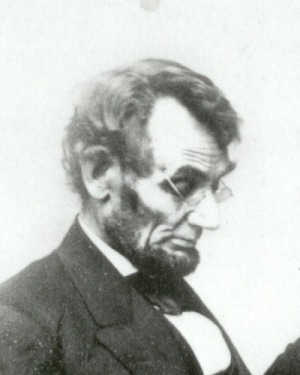

Abraham Lincoln: the Carefully Sanitized Liberator
This brief study suggests that liberators often need to be liberated from their own contradictions.
Many animal rightists know about the quote
attributed to Abraham Lincoln: "I am in favour of animal rights
as well as human rights. That is the way of the whole human
being." The question of its authenticity intrigued me, for I
admire the man, and used the quote in a
pamphlet-in-progress.
This prompted me to do a search through Lincoln's works to see
if they contained those words (in that order!). So far in
scanning his complete works, I never found those felicific
words. I did find some things he did say which may be of
interest, though, and which tarnished my admiration of him. It
will be objected that Lincoln was a creature of his times, and
it is not fair to single him out given the racist idiom of his
day. This should inform our judgment, to be sure. However,
racism can always be challenged and not everyone thought blacks
were inferior or deserving of poor treatment. Also, we need to
get a historical perspective on abolitionist thought. I do not
just mean the abolition of slavery, but of racism more
generally. It is certainly interesting and worthwhile to
explore how racist ideologies of the time manifest in one of
the greatest American presidents and
abolitionists.

Abraham Lincoln
Let us begin with the following quotation:
And now why will you ask us to deny the humanity of the slave? and estimate him only as the equal of the hog? (Abraham Lincoln, The Collected Works of Abraham Lincoln, v. 2 [New Brunswick, New Jersey: Rutgers University Press, 1953], p. 265. Speech at Peoria, Ill., Oct. 16, 1854)
He still could have granted animal rights, just lesser rights than humans. He created a number of images involving killing or harsh treatment of animals. Here is one pertaining to the American Civil War:
If the head of Lee's army is at Martinsburg and the tail of it on the Plank road between Fredericksburg and Chancellorsville, the animal must be slim somewhere. Could you not break him? (v. 6, p. 273. To Major-General Hooker, June 14, 1863)
He still could have thought animals have some kind of rights.
What I did not know is how profoundly racist Lincoln was, notwithstanding his opposition to slavery. Sure, he was a man of his times, and might have been thought to have been merely preserving his dignity when he said:
We can [oppose slavery] without being called negro worshippers. (v. 3, p. 423. Speech at Columbus, Ohio, Sept. 16, 1859)
Animal rightists might not want to be called animal worshippers, either. But did he still hold blacks to be his equals?
Negro equality! Fudge! [19th c. equivalent of...] How long, in the government of a God, great enough to make and maintain this Universe, shall there continue knaves to vend, and fools to gulp, so low a piece of demagougism [sp.-DS] as this. (v. 3, p. 399. Fragments: Notes for Speeches, Sept. 6, 1859)
Hmmm... Well, maybe he held that blacks have rights too, and so do animals, but in a descending hierarchy of some kind. He is less ambiguous here:
I will say, then, that I am not, nor ever have
been, in favor of bringing about in any way the social and
political equality of the white and black races--that I am not
nor ever have been in favor of making voters or jurors of
negroes, nor of qualifying them to hold office, nor to
intermarry with white people; and I will say in addition to
this that there is a physical difference between the white and
black races which will ever forbid the two races living
together in terms of social and political equality. And
inasmuch as they cannot so live, while they do remain together,
there must be the position of superior and inferior. I am as
much as any other man in favor of having the superior position
assigned to the white race.
...notwithstanding all this, there is no reason in the world
why the negro is not entitled to all the rights enumerated in
the Declaration of Independence--the right of life, liberty and
the pursuit of happiness. I hold that he is as much entitled to
these as the white man. I agree with Judge Douglas that he is
not my equal in many respects, certainly not in color--perhaps
not in intellectual and moral endowments; but in the right to
eat bread without leave of anybody else which his own hand
earns [the Republican version of what the other rights amount
to?], he is my equal and the equal of Judge Douglas and the
equal of every other man. (v. 3, pp. 247-8. Sixth Debate with
Steven A. Douglas at Quincy, Ill., Oct. 13, 1858)
It did not stop there. Later, Lincoln addressed a black audience, and insultingly told them what to go do with themselves. His views go beyond apartheid to actual deportation of the black people of America:
But for your race among us there could not be
war, although many men engaged on either side do not care for
you one way or the other. Nevertheless, I repeat, without the
institution of Slavery and the colored race as a basis, the war
could not have an existence [blame the victim].
It is better for us both, therefore, to be separated. ...I
suppose one of the principal difficulties in the way of
colonization is that the free colored man cannot see that his
comfort would be advanced by it. You may believe you can live
in Washington or elsewhere in the United States the remainder
of your life, perhaps more so than in any foreign country, and
hence you have come to the conclusion that you have nothing to
do with the idea of going to a foreign country. This is (I
speak in no unkind sense) an extremely selfish view of the
case. (v. 5, pp. 372-5. Address on Colonization to a Deputation
of Negroes, Aug. 14, 1862)
He then urges the blacks in the audience to make a sacrifice, like those fighting the South in the war, and establish and move to a colony in Central America where they can mine coal.
So much for Lincoln the liberator and lover of all races. What about Honest Abe? We have him denouncing the Democrats in what is now a familiar turn of phrase:
The plain facts, as they appear to me, are these. The administration came into power, very largely in a minority of the popular vote. Notwithstanding this, it distributed to it's [sic- DS] party friends as nearly all the civil patronage as any administration ever did. (v. 5, p. 494. Nov. 10, 1862)
Yet there are many memoranda where he requests the appointment of the "son of a particular friend of mine" (v. 5, p. 552) or of a young man whose "father is one of my best friends" (v. 4, p. 456). No reasons of merit are given in such cases.
Still you have to admire his opposition to slavery, in the following, rooted in the Golden Rule: "Whenever I hear any one, arguing for slavery I feel a strong impulse to see it tried on him personally." (v. 8, p. 361. Speech to One Hundred Fortieth Indiana Regiment, Mar. 17, 1865). Notwithstanding, I am dropping him from my list of quotes (especially since I have heard that at least one Lincoln scholar also doubts the authenticity of the maxim in question).
It has been brought to my attention, by freelance author Robert Alexander, that President Lincoln eventually abandoned his idea of establishing a separate colony for people of colour, and that the President grew very much in his esteem for the people in question not least of all as a result of Lincoln's recognition of their military service during the American Civil War. Mr. Alexander also makes the fascinating point that if Lincoln were any more radically enlightened anti-racism-wise, the statesman probably never would have been voted in by the generally racist electorate of that day. Here I recall, as an example in relation to Mr. Alexander's point, the relevant topic of inter-marriage and note that even so much as the first inter-racial kiss never happened in show business until the first Star Trek television series. It was in the episode entitled "Plato's Children," originally aired in 1968, more than a century after Lincoln died in 1865.
Mr. Alexander eloquently reflects:
Lincoln was not a static figure that can be defined by a certain set of quotes from a particular time period. He was always evolving, developing not only his intelligence but his moral character and sense of truth and justice. This incredible drive to continuously grow as a human being is, I believe, one of the greatest aspects of his character.
May we all aspire to evolve progressively, each in his or her own way.

